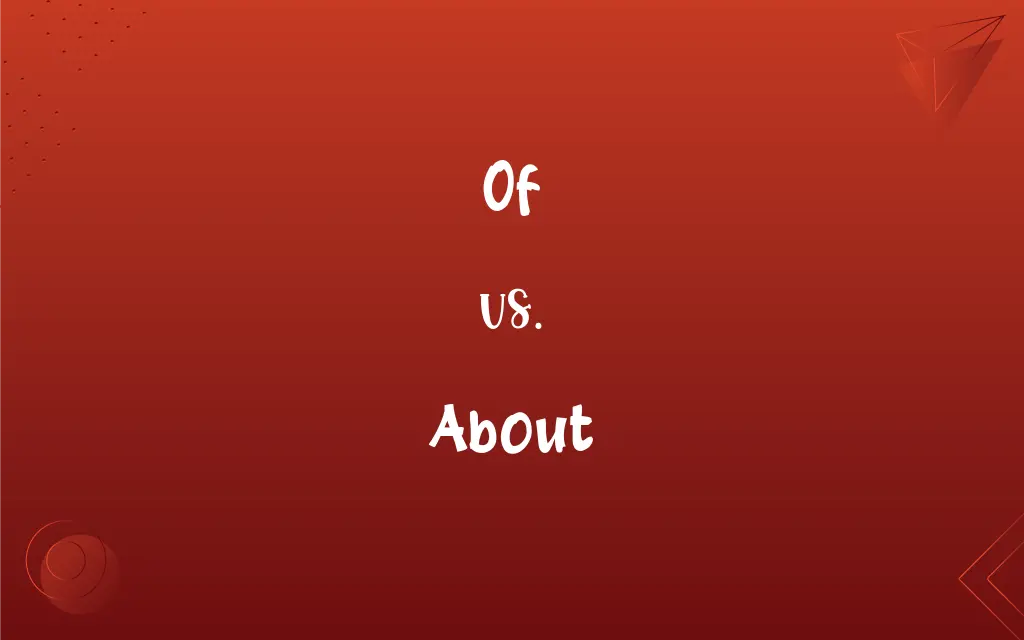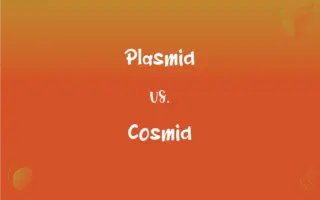Of vs. About: What's the Difference?
Edited by Aimie Carlson || By Janet White || Published on November 21, 2023
"Of" indicates belonging or a part of something, while "about" refers to relating to or concerning a topic or subject.

Key Differences
"Of" is used to denote possession or inclusion, often linking nouns to show what something consists of or belongs to. "About," in contrast, is primarily used to discuss the topic or subject matter of something, like a conversation or book.
"Of" can also indicate the material from which something is made, as in "a ring of gold," whereas "about" often introduces the subject of thought or action, as in "thinking about the future."
In expressions of quantity, time, or age, "of" is common, such as "a group of people," while "about" is used to indicate approximate figures, like "about ten people."
"Of" often forms partitive expressions, indicating a part or fraction of a whole, while "about" is more frequently used in the context of being on the verge of an action, as in "about to leave."
"Of" is intrinsic, specifying the nature or identity of something, as in "city of lights." "About," however, is often used to suggest a relation to something, without being a direct component of it, like "a book about history."
ADVERTISEMENT
Comparison Chart
Basic Function
Indicates possession, belonging, or inclusion.
Refers to relating to, concerning, or approximately.
Usage in Descriptions
Used to specify what something consists of.
Used to discuss the topic or theme.
Context in Sentences
Often indicates origin, composition, or relationship.
Typically introduces a subject or approximate figures.
Partitive Expressions
Common in showing parts or fractions of a whole.
Less commonly used for partitive expressions.
Nature of Relation
Direct and intrinsic to the subject.
Indirect, often about the surrounding context or relation.
ADVERTISEMENT
Of and About Definitions
Of
Indicating possession or belonging.
The pages of the book were torn.
About
Used to indicate movement within an area.
He was walking about the room anxiously.
Of
Indicating a point in time.
It was the evening of July 4th.
About
On the verge of doing something.
She was about to leave when the phone rang.
Of
Expressing a relationship between a part and a whole.
One of the best movies I've seen.
About
Indicating a change in direction.
She turned about to face him.
Of
Denoting the subject of an action.
The destruction of the old building was inevitable.
About
Referring to an approximate amount or time.
About 20 people attended the event.
Of
Expressing what something is made of.
A necklace of pearls and gold.
About
On the topic of; concerning.
She wrote a book about her travels.
Of
Derived or coming from; originating at or from
Customs of the South.
About
Approximately; nearly
The interview lasted about an hour.
Of
Caused by; resulting from
A death of tuberculosis.
About
Almost
The job is about done.
About
To a reversed position or direction
Turn about and walk away slowly.
FAQs
Can 'of' and 'about' be used interchangeably?
No, they have distinct uses and cannot typically be substituted for each other.
Is 'about' used in idiomatic expressions?
Yes, 'about' appears in many idioms, like 'about time' or 'beat about the bush'.
Can 'of' be omitted in some cases?
Yes, particularly in informal speech, such as 'a cup of tea' becoming 'a cuppa'.
Does 'about' always indicate an approximate value?
No, 'about' can also introduce topics or indicate direction, not just approximation.
Does 'of' have a historical usage different from today?
Yes, 'of' had broader uses in older English but has become more specific over time.
Is 'of' used in legal or technical contexts?
Yes, 'of' is frequently used in legal and technical language for precision.
Is 'of' used only for physical possession?
No, 'of' can also indicate abstract relationships like 'idea of beauty'.
Can 'of' indicate a characteristic?
Yes, as in 'a man of honor'.
Are there common mistakes in using 'of' and 'about'?
Yes, one common mistake is using 'of' instead of 'have', as in 'should of'.
Can 'about' imply movement?
Yes, 'about' can describe physical movement, as in 'moving about'.
How do different dialects of English use 'of' and 'about'?
Usage can vary, with some dialects having unique expressions or omissions.
Can 'about' be used to indicate time?
Yes, 'about' can indicate an approximate time, like 'about 3 PM'.
Do 'of' and 'about' have synonyms with similar uses?
Yes, words like 'regarding' or 'pertaining to' can be similar to 'about', for example.
Is 'about' used in questions frequently?
Yes, especially when asking about topics, like 'What is this about?'.
Are there phrases where 'of' and 'about' are used together?
Yes, in phrases like 'thinking of/about you', they can be used together.
Is 'of' used in formal writing more than 'about'?
'Of' is common in formal writing, but its usage depends more on context than formality.
Can 'about' be used in commands?
Yes, as in 'Go about your business'.
How does context affect the use of 'of' and 'about'?
Context determines their appropriate use, especially in idiomatic or fixed expressions.
Do 'of' and 'about' have different uses in British and American English?
There are some differences, but they are generally used similarly in both dialects.
Do 'of' and 'about' change meaning when used in different tenses?
Their meaning stays consistent across tenses, though context can affect interpretation.
About Author
Written by
Janet WhiteJanet White has been an esteemed writer and blogger for Difference Wiki. Holding a Master's degree in Science and Medical Journalism from the prestigious Boston University, she has consistently demonstrated her expertise and passion for her field. When she's not immersed in her work, Janet relishes her time exercising, delving into a good book, and cherishing moments with friends and family.
Edited by
Aimie CarlsonAimie Carlson, holding a master's degree in English literature, is a fervent English language enthusiast. She lends her writing talents to Difference Wiki, a prominent website that specializes in comparisons, offering readers insightful analyses that both captivate and inform.






































































